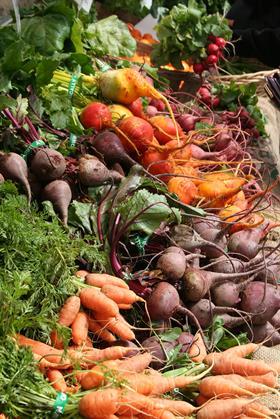
The organic category is in a good place right now, enjoying double-digit growth that suppliers hope will propel it towards a larger slice of the UK food and drink market.
According to Kantar Worldpanel data for the 52 w/e 13 August, an additional £23 million was spent on organic produce in the last year, with volumes also up a healthy 10.3 per cent.
The Soil Association hopes to capitalise on this promising position with its annual Organic September promotion, which this year hones attention on a new addition – Organic September Saturday – encouraging independent retailers across the country to offer giveaways, product samplings and discounts as a way of celebrating the diversity and flavour of organic food.
The initiative comes on the back of healthy sales of organic fruit lines in particular, with bananas the standout performer over the last year. Figures from Nielsen for the 52 w/e 1 July, cited by the Soil Association, show that organic banana sales are up 25.5 per cent, meaning nearly one in ten bananas sold in this country is now organic. The category has achieved a higher share than organic beef and is closing in on eggs, and is also the fastest-growing product across all of organic food and drink in the past 12 months.
“It could be because, like organic milk, organic bananas, which are often linked to a better deal for producers, are seen as an easy way to buy into produce that feels healthier and cares for growers,” suggests Finn Cottle, business development manager at the Soil Association.
Among the retailers, Waitrose continues to be a leading supporter of organic, with a 390 per cent overtrade [Kantar], followed by Sainsbury’s (151 per cent) and Tesco (124 per cent). Waitrose brand manager Kate Gibbs explains: “Organic fruit is very popular at Waitrose, with blueberries being one of our top-selling organic products, appealing to those who are searching out healthy options. We are also seeing significant increases in sales of other fruits such as raspberries and apricots.”
Onlookers will be watching closely to see whether a price war breaks out following Amazon’s decision to slash prices on a basket of products sold by its new acquisition Whole Foods Market, with organic bananas among the products to have their prices cut. If it does, it could further reduce the differential between organic and conventional food.
Whichever way you look at it, this would seem to be a key moment for the category. What is particularly encouraging for the future is that overall category growth is being driven by younger consumers, with the 24-44 age group most committed to buying organic.
As well as the new Organic September Saturday initiative, numerous events are taking place around the country as operators look to capitalise on the growth trend. River Cottage, for example, will be running a series of cookery courses, free talks and events at London’s Borough Market throughout the month, while Daylesford is holding a harvest festival and a Live Life on the Veg Day will be held at Riverford Field Kitchen.
Farmers, chefs and retailers are also getting involved this month by describing their reasons for choosing organic, with well-known figures including TV presenter Kate Arnell, writer Rosie Birkett, chefs Hugh Fearnley-Whittingstall and Tom Hunt, and Better Food Company founder Phil Haughton, among others.
It’s all about emphasising that organics fits in with modern consumer lifestyles and ticks the right boxes for consumers.
As Cottle concludes: “Organic perfectly fits consumer moves towards eating better food, knowing where that food comes from, how it’s grown, avoiding pesticides and the over-use of antibiotics.”



